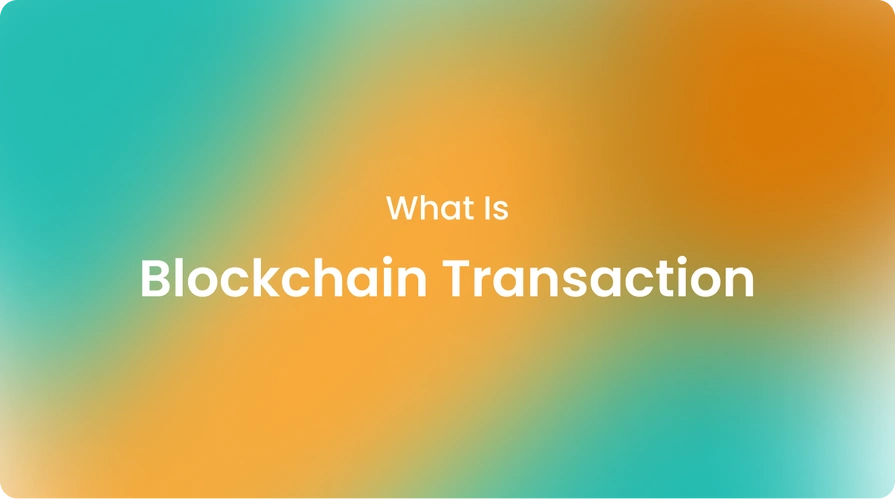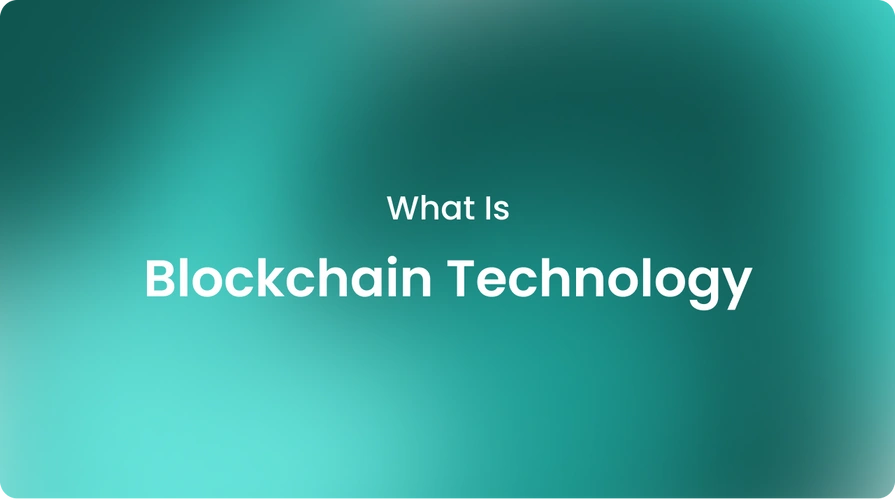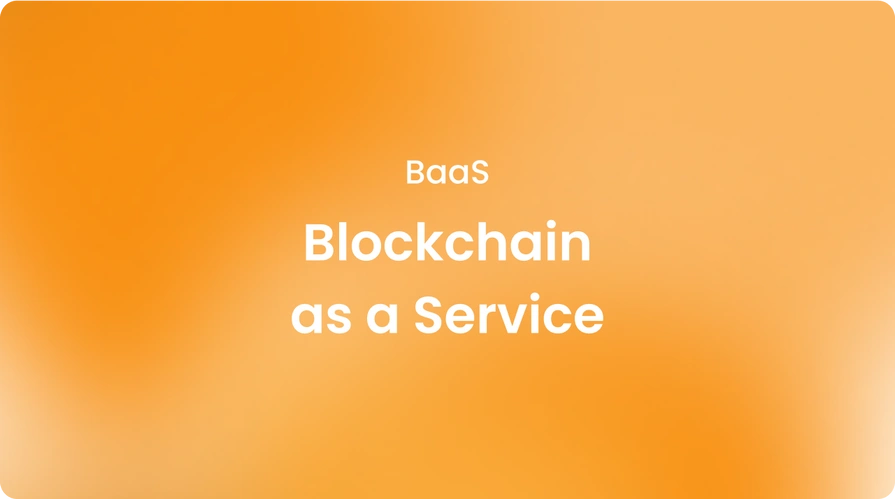|technology, knowledgehub
What Is a Blockchain Transaction?

Blockchain technology is disrupting various industries by enabling trustless and transparent blockchain transactions. However, for many people, the inner workings of blockchain transactions still remain a mystery.
In this blog, we will comprehensively explore how blockchain transactions work, their types, how these transactions are validated, how long it takes to make one, and more. By the end, you will understand how blockchain networks exchange value and data completely.
A blockchain transaction refers to the exchange of crypto coins, crypto tokens, data, or other digitally represented assets between participants on a distributed system of blockchain network.
Whenever you send crypto to a friend or move your funds between crypto wallets, you are performing a transaction on the blockchain. At their core, blockchain transactions are simple value transfers from one address or account to another.
How do blockchain transactions work?
The blockchain transaction process varies slightly between different blockchain protocols but generally follows some common steps.
Here are the common steps for blockchain transactions:
Transaction creation
A user creates a signed transaction specifying the inputs (source of funds), outputs (destination of funds), and transaction fee from their crypto wallet.
Broadcast to the network
The user's crypto wallet broadcasts the signed transaction to the peer-to-peer blockchain network.
Validation
Network nodes validate transactions by checking requirements like digital signatures and available spendable balances. Blockchain nodes reject invalid transactions.
Block creation
Miners use crypto mining to include valid transactions in a new block through a process called proof-of-work.
Addition to blockchain
Miners successfully add blocks containing validated transactions to the immutable blockchain ledger in a linear, chronological order.
Nodes first validate transactions before trusted miners can add them to the authoritative record of balances and ownership in the form of blocks on the blockchain. By doing this, the whole blockchain system keeps track of transactions and stays secure.
Where are blockchain transactions stored?
Miners replicate the entire block across all nodes in the decentralized system network once they include transactions in a new block. Miners distribute blockchain transactions across all participating nodes, rather than storing them in any single location.
As blockchain networks grow, thousands of devices worldwide perpetually store full transaction data. Even if some blockchain nodes go offline, the transactional record remains intact as long as over 51% of the network remains functional.
What is an example of a blockchain transaction?
Let's visualize how a basic cryptocurrency transfer might appear on the blockchain:
- Address A sends 0.5 ETH to Address B.
- The transaction includes both addresses, a cryptographic signature, and the amount (0.5 ETH).
- Network nodes see this, validate the transaction, and bundle it into Block 19070305.
- On the public Ethereum blockchain, there is a record forever showing Address A sent 0.5 ETH to Address B in Block 19070305.
Smart contracts facilitate more complex interactions in other transaction types, automatically triggering them based on predefined blockchain-based rules.
Some examples of this include releasing funds from a multisignature address once milestones are met or implementing the terms of an insurance payout policy.
What are the different types of transactions in blockchain?
While simple value transfers are the most well-known, blockchains support various transaction types:
- Payment transactions move crypto assets from sender to recipient wallets.
- Transactions generate new units of a cryptocurrency as mining rewards, distributed to the address of the miner that solved the block.
- Multisignature transactions require M-of-N signatures to be valid, allowing joint control of funds.
- Metadata transactions store arbitrary metadata, like medical records or digital identities, instead of value transfers.
- Oracles facilitate off-chain data integration by allowing external sources to submit truthful data to the network.
While core functionality involves value transfers, blockchains are programmable ledgers that enable novel types of blockchain transactions for a variety of use cases.
How are transactions validated on the blockchain?
The process of validating transactions is crucial for maintaining the integrity of any blockchain network.
Broadly, there are two main methods for transaction validation:
Proof of Work (PoW)
The CPU-intensive mining process practiced by Bitcoin and other PoW blockchains. Miners compete to solve complex cryptographic hashes, and the first to solve them can group transactions into a new block and earn rewards. This distributed consensus mechanism method secures the network.
Proof of Stake (PoS)
Validator nodes stake a certain amount of cryptocurrency to validate incoming transactions in PoS. Validators who create new blocks are chosen through pseudorandom selection based on the number of coins they have committed.
This is generally more energy efficient than PoW. You can check out “Proof of Work vs. Proof of Stake” for a much more comprehensive examination of each consensus model.
Some cryptocurrencies use a hybrid model too. All full nodes on the network reach consensus on the validity of transactions before permanently adding them to the immutable blockchain ledger.
You can trust Cryptobunq for your blockchain transactions. Cryptobunq offers many crypto services, from node as a service to exchange APIs. You can easily integrate our crypto solutions into your crypto projects to seamlessly validate transactions on different blockchains.
Who validates transactions on the blockchain?
In permissionless blockchains, all participants in the decentralized peer-to-peer network help validate transactions. Miners compete to group transactions into new blocks and receive incentives for maintaining network security through proof-of-work mining.
In permissioned consortium chains, pre-selected blockchain nodes run by network participants like companies, governments, or other entities validate transactions.
The process of distributed consensus across all validating nodes is what makes blockchain technology secure and trustworthy without centralized authorities. Decentralization of transaction validation mitigates risks like censorship and single points of failure.
Are blockchain transactions traceable?
Blockchain transactions offer pseudonymity instead of full anonymity, but they are intended to be public and traceable on the distributed ledger. Each transaction contains information like sender/recipient addresses, the amount transacted, and the associated digital signature.
Combining on-chain transactions with contextual data can sometimes reveal real identities. However, privacy techniques exist to obscure transaction trails and increase financial fungibility.
For example, cryptocurrency mixing services and privacy coins make transaction trails harder to trace by obscuring sender and receiver details. Smart contract platforms enable more private transactions through proxy services that obscure the blockchain transaction ID.
How long does a blockchain transaction take?
Blockchain transaction confirmation times vary depending on the specific network.
On average:
Bitcoin
Bitcoin takes 10–60 minutes for one confirmation, ~60 minutes for six confirmations deemed "irreversible.".
Ethereum
Ethereum takes 2–15 minutes usually, up to an hour for more security.
Bitcoin Cash
Bitcoin Cash takes ~10 minutes on average.
EURK
Stablecoins such as EURK usually take less than one minute and instantly settle.
Network congestion levels and the crypto payment of appropriate transaction fees determine the confirmation times for blockchain transactions. Higher transaction fees will get priority processing and fewer delays.
Six or more confirmations make double-spends highly unlikely, even though unconfirmed transactions can still theoretically be overridden after long chains develop.
How do I check my blockchain transaction history?
All major cryptocurrency wallet providers and blockchain explorers allow users to easily view their transaction histories. To check blockchain transaction history on any public blockchain:
- Access your wallet dashboard or go to a blockchain explorer site.
- Enter the public address you sent or received funds from.
- The explorer will display all transactions associated with that address, including timestamps, amounts, and links to other involved addresses.
- Filter by transaction type, like incoming or outgoing, to trace the flow of funds.
- You can also search by specific transaction hash IDs to retrieve single transaction details.
Additionally, you can import accounts into non-custodial wallets like Cryptobunq to track activity privately. You can benefit from CBQ custody and wallet solutions for this step.
Crypto exchanges like Cryptobunq show inbound and outbound transactions on deposit and withdrawal pages. Cryptobunq also allows tracking crypto along with traditional books with the power of blockchain technology.
Blockchains allow users to check the status of any blockchain-unconfirmed transaction through blockchain explorers. Popular public ledgers like Bitcoin, Ethereum, and EURK have robust explorers for easy access to any user's transaction records without logging into private wallets.
Combined with wallet integration, this provides full transparency and auditability for blockchain transactions. Cryptobunq is here for you to help every step of the way with secure transactions.
How do I find transaction hash IDs on the blockchain?
Users can utilize the unique cryptographic hash ID assigned by blockchain networks to lookup specific transactions on blockchain explorers. Users can utilize this identifier to lookup specific transactions on blockchain explorers. To find transaction hash IDs:
- Access your crypto wallet's transaction history page.
- Locate the transaction you wish to look up and copy its long alphanumeric hash ID.
- Paste the hash ID into the search bar on a blockchain explorer.
- This will return all details of that single transaction, like addresses, amounts, and confirmation status.
- You can also track down transaction hashes from wallet notifications, emails, texts, or transaction receipts.
- Some explorers even let you paste in raw transaction data to derive the hash ID.
Having the hash makes it easy to retrieve proof or further trace transaction pathways as needed for tax, accounting, or dispute resolution purposes. It links directly to the on-chain transaction record. You can check “Crypto hash rate” and “Bitcoin’s hash rate” for more details about hashes.
The bottom line
Blockchain technology revolutionizes the digital transfer of value through cryptocurrencies like Bitcoin and stablecoins like EURK. The distributed ledger model brings transparency and trust to transactions by recording them publicly and permanently through consensus validation.
Understanding how blockchain transactions work sheds light on this innovative technological concept with far-reaching applications. Whether browsing transactions in public or interacting directly through a crypto wallet, the blockchain gives users new control over their financial data and digital assets.
This new transaction paradigm has immense potential to streamline commerce, build more inclusive financial systems, and transform a variety of sectors through programmable trust.
While still early in development, blockchain technology's rise continues to disrupt traditional business and government models. Cryptobunq is a crypto-aware digital bank offering various services in crypto and blockchain in this aspect.
Cryptobunq offers investing in blockchain, blockchain payment solutions, blockchain wallet, batch payments, and many more services with the power of blockchain.
You can trust one-stop-shop crypto service provider CBQ to securely buy and manage digital assets. Make sure to check our case studies to learn more about our blockchain and crypto services and contact us!













